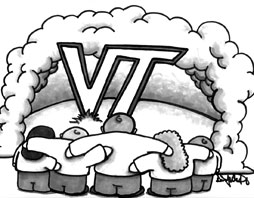By Charity Montieth/managing editor
The Virginia Tech massacre has sent shock waves across college campuses all over the country, leaving many students questioning their safety.
“ TCC has earnestly been working to increase security over the last five years,” Erma Johnson-Hadley, vice chancellor for administrative and community services, said.
Although TCC police had tactical security measures in place prior to the recent shootings, Frank Buchanan, TCC chief of police, said the incident is causing TCC, like much of the nation, to re-evaluate campus security.
“ [TCC has] formulated a task force to review the present system and search for new ways to increase safety,” he said.
Citing security issues, Buchanan declined to provide tactical information, but said the task force comprises key personnel, who will first explore any weaknesses and then examine new technology in an effort to reinforce security.
Communication with students off and on campus during an emergency has been a main concern stemming from the recent shootings.
Buchanan said there are a number of ways TCC police can communicate with students in a crisis situation, ranging from verbal to electronic communication.
TCC’s squad cars are implemented with public communication systems that would warn students and provide official directions. Additionally, each building on campus has a portable bullhorn that faculty members can use.
Official notices also can be made public through the use of Campus Cruiser and TCC’s Web site, Buchanan said.
Virginia Tech has been highly criticized for its use of electronic communication, but Buchanan said for TCC, it could be a matter of safety.
“ We have to consider the safety of our students and staff first,” he said. “And if you have an active shooter, the use of a [portable] bullhorn could draw unwanted attention from the shooter.”
SE Campus currently has a centralized public address system in place. Because the campus is nearly 30 years newer than other TCC campuses and primarily one building, it is the only campus with a permanent public address system.
The district has plans to install tornado warning sirens with a public address system on each of the campuses, including downtown.
“ The sirens are ready to go, we just need to work out the installation logistics,” Johnson-Hadley said.
NW and South campuses will be the first to get their sirens. The district anticipates they will be operational by the end of June, David Hoelke, director of systems infrastructure and engineering, said.
SE and NE have been scheduled for the end of August, and the downtown campus will be installed as construction permits.
TCC would also utilize local television and radio stations to prevent students from coming to campus as well, Buchanan said.
Since the Columbine and Sept. 11 attacks, the TCC police department has worked with the FBI and other law enforcement training agencies in an effort to respond appropriately in an emergency.
“ Our officers undergo thorough First Responder training with regular remedial refresher training sessions,” he said. “It’s similar to regular CPR training.”
As far as faculty is concerned, Johnson-Hadley said that TCC has general safety guidelines that are specifically tailored to each campus.
All of the deans and vice presidents have campus-specific information detailing the procedures that would be relayed down to teachers as needed in an emergency situation.
“ We don’t run any drills, but the faculty is involved in emergency management,” she said. “Of course, if it’s a life-threatening situation, they have been taught to dial 911 first.”
As an immediate precaution, Buchanan urged teachers and students to program the campus police telephone number into their cell phones. The district dispatch line is manned 24 hours a day and can be reached by calling 817-515-8911.
“ You can also call 911, but the campus police may be able to respond more quickly,” he said.
In the event of a life-and-death situation, when police are not available, Buchanan said teamwork could save lives.
“ Of course, the police are here to protect you. But if it comes down to it, students should work together to take control,” he said. “Use pens, pencils, soda bottles, anything you can get your hands on to come out alive.”
WHAT TO DO
TCC officials lock down a campus, or if an active shooter is seen or heard, the best plan of action is to establish a safe area, generally an interior room that can easily be secured from intruders.
• Do not go looking for the shooter: Proceed to the nearest classroom, office or work room that can be established into a safe area.
• Establish a safe area: Lock the doors and close windows and blinds. If the door does not lock, barricade the door by stacking any available furniture against it. Turn off the lights and remain quiet.
• If you are in a classroom: Stay in the classroom and establish a safe area. Move away from windows and doors, using desks or tables as additional protection.
• If you are in a hallway or open environment: Quietly proceed to nearest classroom, office or other safe environment.
• If you are outside: Take cover by crouching behind a concrete barrier. If you have a cellular phone, call police for assistance, but only if doing so will not draw attention to you. Remain quiet.
• Do not leave your established safe area until police have notified you to do so.
TCC police recommend programming your campus police phone numbers into your cellular phone to
reach authorities quickly in the event of an emergency.
• District Dispatch 817-515-8911
(24 hours a day)
• NE Campus 817-515-6311
• NW Campus 817- 515-7722
• South Campus 817-515-4570
• SE Campus 817-515-3911
• Or dial 8911 from any TCC phone
Source: Frank Buchanan, TCC chief of police























